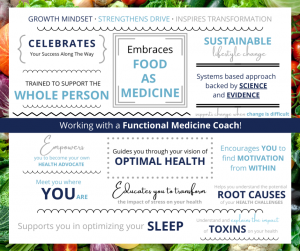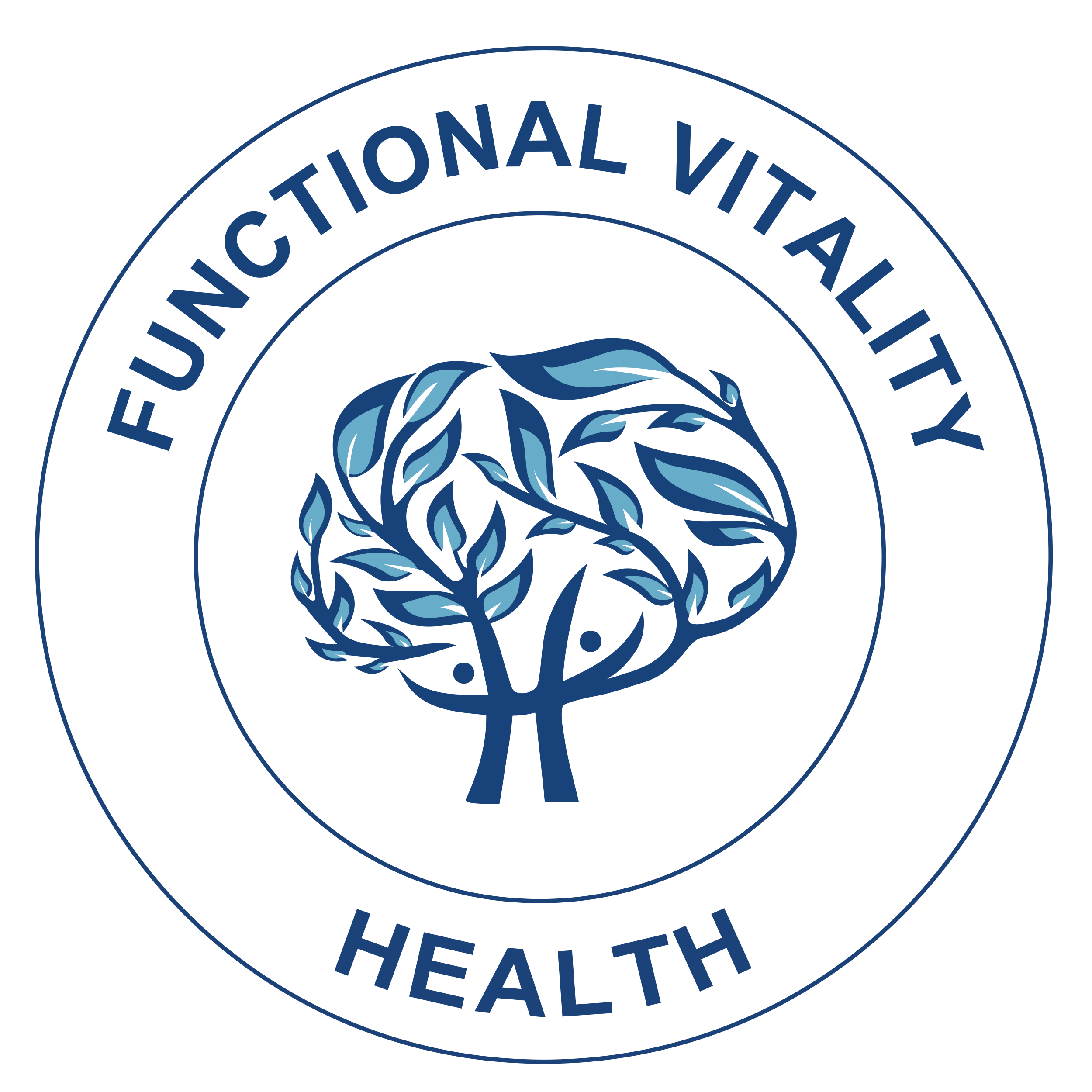A simple definition of coaching is a vehicle for helping people achieve a higher level of well-being and performance in life and work, particularly when change is hard. It’s a partnership in a thought-provoking and creative process that inspires and supports clients to maximize their personal and professional potential, which is particularly important in today’s uncertain, complex and often overwhelming environment.
Melanie has been trained to speak the language of Functional Medicine through her extensive training with the Functional Medicine Coaching Academy. This is the only program in collaboration with the Institute for Functional Medicine. She is able to partner with Practitioners and understands “root cause medicine” in order to get the results. Melanie provides support, accountability and a non-judgemental approach, along with the ability to see a client’s vision and what is their “why” for wanting to achieve their best health. Melanie very much honours clients as the expert in their life and work, and she is there to assist in connecting the dots between who they are and who they want to be and in taking the incremental behavioural steps that will enable them to succeed in their desired changes, leading to a higher level of health and well-being.
I typically work with individuals, couples, families across all spectrums, from those looking to regain declined physical performance, hormonal imbalances, desires for optimal health span, which also includes brain coaching for those experiencing cognitive decline caused by several risk factors.
What does it look like working with a health coach?
Coaching sessions that typically occur on a regular basis will have the most favourable outcomes, especially at the beginning. The first intake is 60 minutes, followed by 30-45 minute follow-up sessions and then spread out from there. Health coaching is not a one and done strategy. Sessions are always structured around the needs of the client, very much client driven. I’m not the expert in their life; they are. I work to accommodate an individual’s schedule and lifestyle and help them achieve their goals within that framework. Often the medical practitioner identifies the ‘what’ as far as the diagnosis is concerned and part of the how in order to address it. I help clients uncover their ‘why’ so that the ‘how’ becomes very personal to them, thus making it more achievable. I essentially help get clients to where the medical practitioner would like to see them.
I may work with a single millennial who has no children, and my approach may be quite different than, for example, a person in midlife, with a young family and at the apex of their career. At the end of the coaching relationship, the goal is to have the client fully confident that they can continue on the path that they’ve started and maintain all the progress that they’ve achieved.

Are there any perquisites to working with Melanie?
I’m happy to work with almost everyone, but the determining factor will be the client’s level of motivation and the priority they are putting on their health. Much like an athlete can have a great coach, they have to be willing to do the work to see the results on the field. I can be a motivating factor, but the client themselves has to be prepared to be accountable. I’m equipping clients to be responsible for their health outcomes. It doesn’t matter where you are on the spectrum of readiness, as long as you’re prepared to take the first step.
One thing I want my clients to know is that is because I am a health coach, it doesn’t mean I’m perfect. I simply do my best waking up each day with the intent of continuously finding ways for improvement. So, I’m not looking to shove kale down anyone’s throat or do anything I wouldn’t consider myself. I do understand that life happens, so I can confidently say that I approach clients without judgment. There’s just no place for that in coaching, and I will simply hold you accountable to the goals that you yourself have set and nudge you here and there to help you stay the course. I offer regular support and communication.
Can you tell us about some topics you may go over in health coaching?
Functional Nutrition
Proper nutrition is a big component. You will often hear the phrase “food as medicine,” which is truly the magic of nature to help our own biology, this is foundational. We may talk about eating the rainbow– choosing high antioxidant foods, adequate fibre. Eat a whole foods-based diet rich in colourful fruits and vegetables. We will remove the offenders in a variety of ways and fuel your body with what is best suited to it. Quality meats and healthy fats are critical, as well as drinking enough water. I can support clients through any of the Institute for Functional Medicine food plans such as the Mitochondrial, Core, Cardio, Detox & Elimination diet plans. If you’re following a PreCODE or ReCODE plan through my Brain Coach work, we may move towards a KetoFlex 12/3 diet, and I can help troubleshoot as you move through. This involves time restricted eating with the idea to move more towards ketosis to fuel the brain and body, and is through the work of Dr. Dale Bredesen at Apollo Health.
Sleep
This is a big one for most of us. Odds are, most clients are not getting enough sleep, and there can be a number of reasons for this. The concern is the bigger consequences ranging from irritability, brain fog and weight gain to more serious conditions like hormone dysregulation, heart disease, memory impairment, diabetes and Alzheimers.
Most clients are not waking up feeling refreshed from sleep. Together we will find ways to manage sleep through things like when and how you eat and exercise, how you handle stress, how you nap and how you engage with technology, along with the setup of your sleep environment. We can also track it and measure it by understanding your heart rate variability (HRV), deep sleep and REM. These are all clues to a person finding their rhythm with rest.
Stress & Relaxation
A lot of my training has been based in Positive Psychology and playing to a person’s character strengths. What’s right and going well with a person versus what is wrong, which can be the traditional approach to psychology. There is a survey I use called the VIA Character Strengths that willing clients can complete that reveals an individual’s top three strengths and what we each tend to draw on in times of stress. There are 24, and we all house them, but it’s always interesting to find out a client’s top strengths as their coach and for their own use.
It’s important to learn to recognize when we’re stressed and what ways are effective for us to pull away from that state, the fight or flight state that we’ve become accustomed to, but we were never designed to stay in. Breath is so important – taking time throughout the day to breathe properly. I will teach you how to do this. Some other wonderful ways to handle stress within coaching may be prayer, gratitude, meditation, journaling, spending time in nature. Are you taking time to relax or nap, making time to participate in things that you enjoy, when is the last time you felt creative? These are things that may be components of your coaching plan.
Exercise & Movement
Regular movement throughout the day and what is best for your body, determined by your practitioner report, is important– both aerobic exercise, and high intensity (HIIT workout), and resistance training, including weight lifting, resistance bands, yoga, and Pilates, have also been found to deliver sleep-promoting benefits if done consistently.
We are often tied to our desks and computers, so what are ways we can incorporate movement while still getting the job done? Break up the day, what is achievable for you. Get creative if what you’re doing isn’t working. It’s also important to manage your stress through movement and find activities you enjoy, but don’t overdo it.
Those are just some of the high-level approaches I take to general health coaching.
What is Brain Coaching?
There is more and more research coming out that is helping us understand how following FM principles can help slow and reverse symptoms of cognitive decline. One example is the PreCODE and ReCODE programs that have come about through the work of Dr. Dale Bredesen at Apollo Health. Dr. Bredesen wrote a few books, one titled The End of Alzheimer’s. There are additional training extensions for Functional Medicine Practitioners and Functional Medicine Health Coaches. Having been trained in the PreCODE/ReCODE programs and now having completed their recently upgraded 2.0 training, I am able to support patients with often more complicated or complex needs through what’s called the Bredesen 7. If some decline has been revealed, then we will work through a foundational coaching program as I’ve already described with additional components for a deeper dive into brain health. These include working towards target lab ranges and values for optimal cognitive outcomes.
I also want to note that this element of coaching can also include caregiver support which is often the spouse of the client experiencing cognitive decline, and it is a valuable component of care while clients are transitioning to a very specific lifestyle protocol. I have a deep love for this work, and really these are lifestyle practices we should all be utilizing. It’s never too late to begin.
If you have further questions, please email: hello@functionalvitality.ca Ready to explore further? Please book a discovery call with Melanie here and learn if we’d be a good match for coaching.

